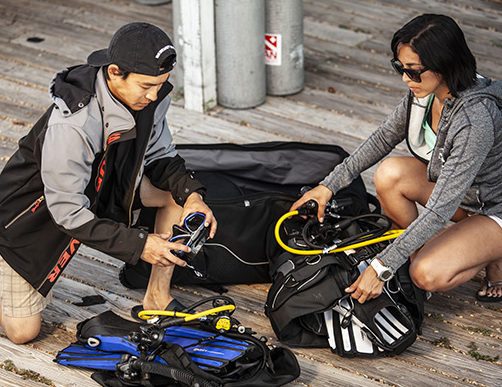STAFF HEALTH
AND SAFETY

THE MANTRA “TAKE CARE OF YOUR EMPLOYEES and they will take care of your business,” is especially true in the dive industry. Taking care of your employees helps builds morale, enhances efficiency, reduces lost time and staff turnover, helps lower insurance costs and, importantly, ensures compliance with the law.
Owners sometimes assume their responsibilities extend only to formally appointed employees, perhaps not considering contractors, seasonal employees, interns, and others. Health and safety (H&S) legislation applies to everyone working on your premises, where you are responsible for providing a safe working environment. This includes full- and part-time employees, interns, commission-based operators, freelancers, contractors, seasonal workers, and even friends of the family. They are all covered by H&S laws.
OCCUPATIONAL HAZARDS
IN THE WORKPLACE
A thorough assessment of all potential workplace hazards is essential. This will enable you to address, mitigate, or at least contain the risks under your control.
Some often-neglected or unassessed hazards include overexposure to ultraviolet rays, noise-induced hearing loss, long-term effects of working with harmful cleaning chemicals, exposure to biological pathogens, decompression stress, musculoskeletal injuries incidental to the occupation, and even workplace stress due to performance pressure, overwork, and burnout.
INSURANCE COVERAGE
Dive businesses should ensure they take advice from appropriate insurance providers. There are important differences between general business and professional liability coverage, property and marine insurance, occupational H&S and workers compensation, and health and dive accident insurance.
Employees, clients and the broader public all have safety rights when engaging with a dive business. A thorough review of insurable risks is part of protecting your investments.
H&S SURVEILLANCE
AND FITNESS FOR DUTY
Some health-related issues may be based on preexisting conditions, and some are purely a result of aging. Screening employees both prior to employment or appointment and then periodically throughout employment (and when exposed to any identified workplace hazard) will provide you with a good degree of protection against future occupational-health-based compensatory claims. Relevant examples include existing hearing or skin conditions and a dive professional with a (perhaps concealed) history of asthma.
Fitness-for-duty is about more than just a form that is completed during the appointment process. Daily monitoring of any unfitness for work is essential and should include conditions such as symptoms of respiratory or gastrointestinal infections, effects of alcohol or drugs, exhaustion, and physical injuries.
RECORD KEEPING
Let’s consider these wise words: “If it doesn’t exist in writing, it doesn’t exist.” A lack of comprehensive personnel records detailing employees’ health, current qualifications and job responsibilities may render you vulnerable to employee-related actions or claims of discrimination or unfair treatment.
File all personnel records, exposure records, incident and accident reports, medical surveillance records and claims, and necessary disciplinary documentation in your business’s information database. This provides you with easy-to-retrieve and credible records and will serve you well should a compensatory claim be made — even if it pertains to a years-old incident. Invest in Your Staff When you invest in employee health and safety, the results permeate into all aspects of your business. Your employees will feel seen and valued and take pride in their work, creating a richer and more enjoyable customer experience. The investment now will pay dividends in the future.
INVEST IN YOUR STAFF
It is possible that your request for more information from a customer might be interpreted as invasive or discriminatory. However, this is important information that you need in order to keep everyone involved safe. It’s necessary to make sure customers are diving within the scope of their training, are physically and medically fit to dive, and are not being exposed to undue risk.
Operators should put policies in place that are designed to provide consistent, systematic screening of customers, especially if they are expected to engage in higher-risk activities such as technical or deep diving or diving in a remote location. This screening should include proof of certification, the date of the customer’s last dive, language comprehension, age, experience level, and comfort in the water. Additionally, a fitness-to-dive questionnaire or questions relating to preexisting medical conditions should be required. This should include some assessment of the diver’s physical abilities before they enter the water.
DAN Customer Service
Mon–Fri, 8:30 a.m. – 5 p.m. ET
+1 (919) 684-2948
+1 (800) 446-2671
Fax: +1 (919) 490-6630
24/7 Emergency Hotline
In event of a dive accident or injury, call local EMS first, then call DAN.
24/7 Emergency Hotline:
+1 (919) 684-9111
(Collect calls accepted)
DAN must arrange transportation for covered emergency medical evacuation fees to be paid.
Medical Information Line
Get answers to your nonemergency health and diving questions.
Mon–Fri, 8:30 a.m. – 5 p.m. ET
+1 (919) 684-2948, Option 4
Online: Ask A Medic
(Allow 24-48 hours for a response.)

